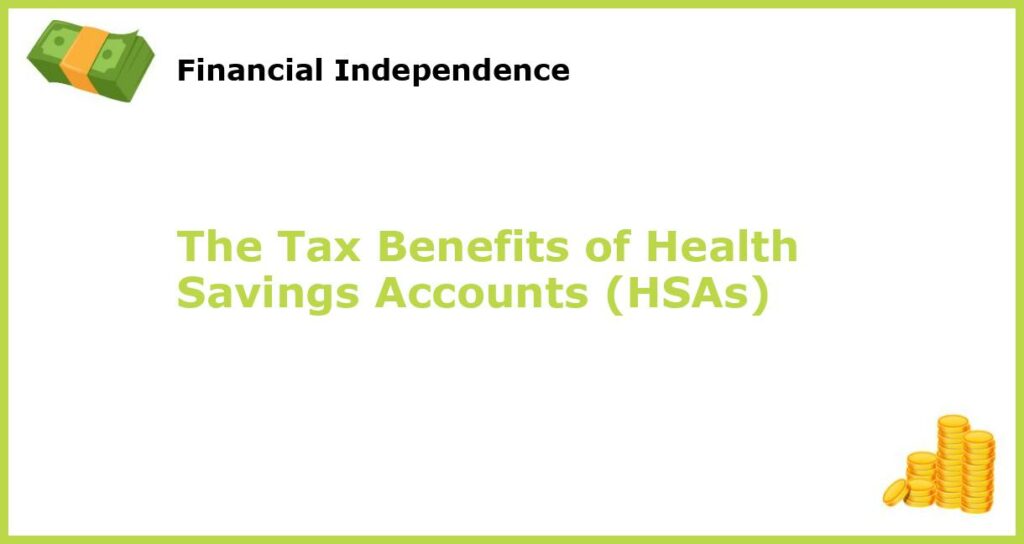Health Savings Accounts (HSAs) are a great way to save for healthcare expenses while getting significant tax benefits. They are now increasingly becoming popular among Americans, especially those who are self-employed or work for small businesses. In this article, we will take a deep dive into the tax benefits associated with HSAs and how they can help you save money on healthcare costs.
1. HSAs offer tax-deductible contributions

The biggest advantage of having an HSA is that you can make tax-deductible contributions. The contributions you make to your HSA can be deducted from your taxable income, reducing your overall tax liability. This can result in significant savings, especially for those in higher tax brackets.
For instance, let’s say you are in the 25% tax bracket and you contribute $3,000 to your HSA account. This contribution will help you reduce your taxable income by $3,000, which means you can save up to $750 in taxes.
The tax-deferred nature of HSAs makes them more attractive as they allow you to pay for healthcare expenses while saving a lot on your taxes. You may use this saved money on other expenses.
2. HSA earnings are tax-free

Another great tax benefit of having an HSA is that any earnings on your account are tax-free. This means that you can accumulate interest or other investment gains on your HSA balance without having to pay taxes on them. This can result in significant savings over time, especially if you invest your HSA funds wisely.
Since HSAs are long-term savings accounts, the tax-free structures allow for more significant growth over an extended period of time. This tax-free nature can be more advantageous because it can accumulate interest without being subject to taxes.
3. HSA withdrawals are tax-free for qualified medical expenses

Perhaps the most significant tax benefit of having an HSA is that withdrawals are tax-free when used for qualified medical expenses. This means that you can use your HSA funds to pay for healthcare expenses, including deductibles, copayments, and other out-of-pocket costs without having to pay taxes on the amount withdrawn.
This tax-free withdrawal feature is one of the most significant factors for choosing an HSA. The qualified medical expenses would include almost all of the medical treatments and services.
Therefore, HSAs can become an emergency backup plan or a long-term savings account for your retirement years or any future health needs.
4. HSA funds can be rolled over from year to year

Unlike Flexible Spending Accounts (FSAs), HSAs do not have a use-it-or-lose-it provision. This means that any unused funds in your HSA account can be rolled over from year to year, allowing you to accumulate additional savings over time.
This rollover provision is an essential benefit of HSA, which enables you to save more money. The unused funds can roll over from year to year, and your HSA balance can continue to accumulate if you do not use it for medical expenses.
Moreover, the funds can also be invested in mutual funds or used for other purposes.
5. HSA funds can be invested for long-term growth

Another advantage of having an HSA is that you can invest your funds for long-term growth. Many HSA providers offer a range of investment options, including stocks, bonds, and mutual funds, allowing you to potentially grow your savings over time.
The investment performance part of the HSA can be the most critical benefit. Most of the HSA providers allow you to invest HSA funds without a minimum balance. It means that you can grow your funds by investing them in the financial markets depending on the provider’s investment options.
6. HSAs can be used to pay for healthcare expenses in retirement

HSAs can also be used to pay for qualified medical expenses during retirement. This can be a significant benefit, as healthcare costs tend to increase as people age. By contributing to an HSA during your working years, you can build up a significant amount of savings that can be used to help cover your healthcare expenses in retirement.
Contributing to an HSA can secure your retirement years from unexpected medical bills. Also, since contributions to HSAs are tax-deductible, the HSA account can double as a retirement savings account.
7. HSA contributions can come from both the employer and employee
HSAs can be funded by both the employer and employee. This means that if you work for a company that offers an HSA, you can contribute funds from your paycheck on a pre-tax basis, and your employer may also contribute to your account.
Employers also have the option to offer HSA’s to their employees. Employers who contribute to HSA’s will get tax benefits too. Their contributions can be tax-deductible as well. It means that they are motivated as their contributions will reduce their company tax liabilities.
8. HSA funds can be used for a wide range of healthcare expenses
HSAs can be used to pay for a wide range of healthcare expenses, including prescription drugs, medical equipment, and even some alternative therapies. This flexibility can allow you to use your HSA funds to address a variety of healthcare needs.
The flexibility of HSAs is perhaps the most attractive feature. Also, the range of healthcare expenses that are counted under ‘medical expenses’ is huge. It includes almost all treatment options, such as acupuncture, dental treatment, eye care, eyeglasses, and even some alternative treatments.
9. HSAs can be a valuable tool for managing healthcare costs
By combining an HSA with a high-deductible health plan, you can potentially save money on your healthcare costs. HSAs can help you manage your healthcare expenses by allowing you to budget for these costs and build up savings to cover them.
When the HSA got combined with HDHP, the plans could reduce healthcare costs. And thus, it can also help you save money in the long run. Also, by managing and budgeting, you can save up to cover any sudden medical expenses that you might come across eventually.
10. HSAs are a smart financial decision for many individuals
Overall, HSAs can be a smart financial decision for many individuals, especially those who are looking to save money on healthcare costs and reduce their tax liability. By taking advantage of the tax benefits associated with HSAs, you can potentially save thousands of dollars over time.
HSAs are tax-advantaged savings accounts that are more advantageous to individuals in the long run. They are perfect for people who want autonomy over their medical expenses and save on taxes.
Moreover, their versatility in terms of tax deductions, rollover options, and investments can work towards benefiting individuals who are looking for long-term healthcare planning.







